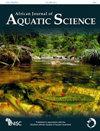埃塞俄比亚大裂谷两个湖泊Abaya湖和Chamo湖的湖泊特征和水质变化
IF 1
4区 环境科学与生态学
Q3 MARINE & FRESHWATER BIOLOGY
引用次数: 0
摘要
我们在2016年至2019年期间对埃塞俄比亚裂谷最大的两个湖泊Abaya湖和Chamo湖进行了一项研究,以评估它们的湖泊特征,并推断一些水质参数的长期变化。通过实地测量和实验室分析获得的物理化学参数和浮游生物群落的数据与文献结果进行了比较。阿巴亚湖的浊度、盐度、硝酸盐和可溶性活性磷呈上升趋势,而查莫湖的电导率、盐度、硝酸盐和可溶性活性磷呈上升趋势。两湖水体透明度和叶绿素a浓度均呈下降趋势。尽管Abaya湖的有效营养物质比Chamo湖高,但较高的浊度和悬浮物导致叶绿素-a浓度较低,浮游动物丰度较低。阿巴亚湖轮虫和甲壳类动物的丰度低于查莫湖。利用总磷、Secchi深度和叶绿素-a的平均营养状态指数表明,两个湖泊都处于富营养化状态。我们的研究结果与以往的研究结果一致,并表明主要湖泊特征的变化是采取干预措施的信号,以防止进一步的生态退化,并维持直接依赖湖泊的渔民的生态服务和生计。本文章由计算机程序翻译,如有差异,请以英文原文为准。
Limnological features and water-quality changes of two Ethiopian Rift Valley lakes, Lake Abaya and Lake Chamo
We conducted a study in Lake Abaya and Lake Chamo, the two largest Ethiopian Rift Valley lakes, between 2016 and 2019, to evaluate their limnological features and infer longer-term changes in some water-quality parameters. Data generated through in situ measurements and laboratory analyses of physico-chemical parameters and the plankton communities were compared with results from the literature. Turbidity, salinity, nitrates and soluble reactive phosphorous showed an increasing trend in Lake Abaya, while in Lake Chamo conductivity, salinity, nitrates and soluble reactive phosphorous showed an increasing trend. In both lakes the water transparency and chlorophyll a concentration showed a declining trend. Despite higher available nutrients in Lake Abaya compared with Lake Chamo, higher turbidity with suspended solids contributed to lower chlorophyll-a concentrations and lower zooplankton abundance. The abundances of rotifers and crustaceans were lower in Lake Abaya compared with Lake Chamo. The mean trophic state index using total phosphorus, Secchi depth and chlorophyll-a shows that both lakes are in a eutrophic state. Our findings are consistent with previous studies and indicate that changes in major limnological features are a signal to take intervention measures to prevent further ecological degradation and to sustain the ecological services and livelihoods of fishers who are directly dependent on the lakes.
求助全文
通过发布文献求助,成功后即可免费获取论文全文。
去求助
来源期刊

African Journal of Aquatic Science
MARINE & FRESHWATER BIOLOGY-
CiteScore
3.90
自引率
7.10%
发文量
31
审稿时长
>12 weeks
期刊介绍:
The African Journal of Aquatic Science is an international journal devoted to the study of the aquatic sciences, covering all African inland and estuarine waters. The Journal publishes peer-reviewed original scientific papers and short articles in all the aquatic science fields including limnology, hydrobiology, ecology, conservation, biomonitoring, management, water quality, ecotoxicology, biological interactions, physical properties and human impacts on African aquatic systems.
 求助内容:
求助内容: 应助结果提醒方式:
应助结果提醒方式:


